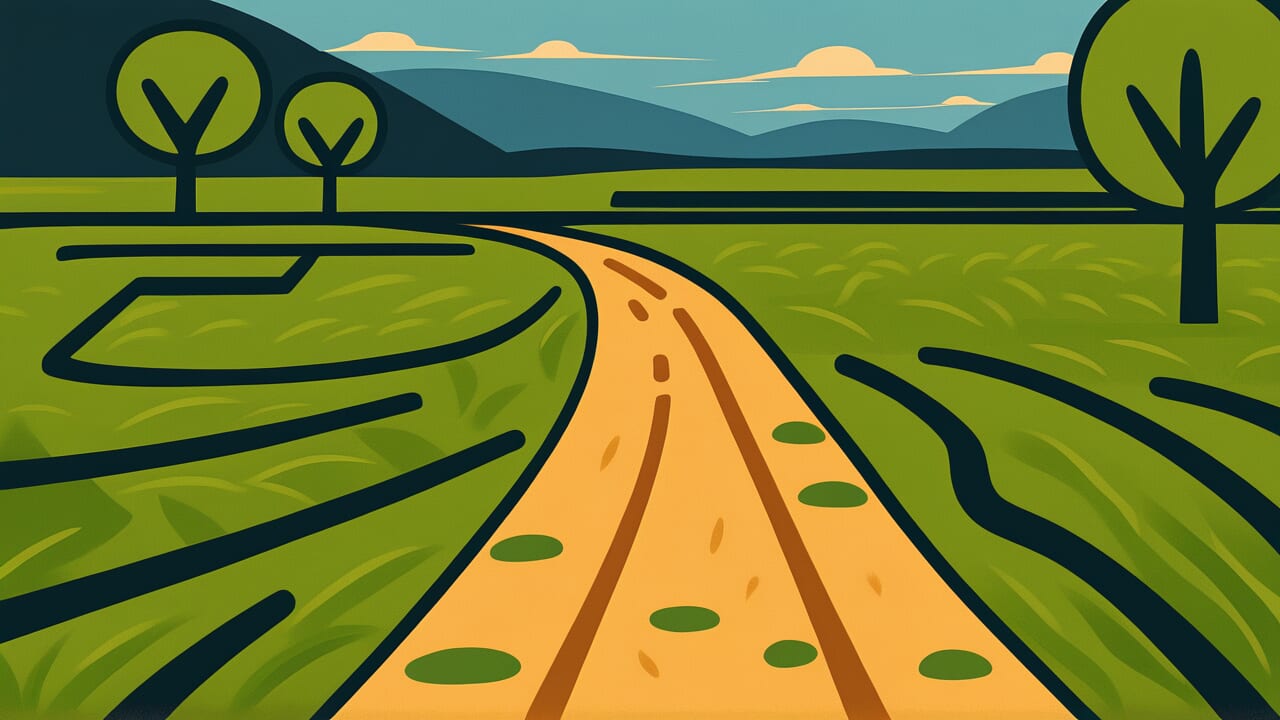How to Read “Grass doesn’t grow where people pass”
Hitodōri ni kusa haezu
Meaning of “Grass doesn’t grow where people pass”
“Grass doesn’t grow where people pass” means that grass cannot grow in places where people frequently walk. This proverb expresses a simple physical fact.
In areas where many people constantly walk, the ground gets trampled repeatedly. This prevents grass from taking root and growing.
This proverb is used to show how continuous activity affects the environment. Places with constant foot traffic naturally stay clear of grass without any special maintenance.
The saying also implies the opposite truth. When people stop using a path, grass quickly covers it again.
Even today, people use this expression to explain the difference between well-used facilities and abandoned places.
Origin and Etymology
No clear written records explain the origin of this proverb. However, we can understand how it developed from its structure and Japanese daily life.
The word “hitodōri” refers to roads or places where people frequently pass. Since before the Edo period, every village had such places.
These included village centers, roads to markets, and paths to shrines and temples. In these locations, people’s feet naturally packed down the ground. This made it impossible for grass to take root.
For Japanese people who lived mainly through farming, how grass grew was an important indicator of land condition. Abandoned land quickly became overgrown with grass.
In contrast, places where people continuously worked stayed clear. This observation likely gave birth to “Grass doesn’t grow where people pass.”
This proverb goes beyond simple nature observation. It expresses the relationship between human activity and the environment in a clear way.
Our ancestors found a universal truth in everyday scenes everyone could see. Continuous effort changes the environment. This wisdom lives on in this proverb.
Usage Examples
- The plaza in front of the station shows that grass doesn’t grow where people pass – the ground is always packed down clean
- That mountain path used to be an example of grass doesn’t grow where people pass, but now it’s overgrown and you can’t even see where the trail was
Universal Wisdom
“Grass doesn’t grow where people pass” contains a timeless truth. Continuous effort shapes our environment. Why has this simple observation been passed down through generations?
This saying gives us essential insight into how human activity and environment relate to each other.
Humans change their surroundings through daily activities, even without conscious maintenance. Just walking the same path every day keeps that path clear.
No special effort is needed. The simple flow of people maintains the environment. This shows a life truth: big changes come not from dramatic actions but from daily accumulation.
On the other hand, places people abandon quickly become wild. Even once-busy roads get covered with grass when feet stop passing through.
How fast this happens shows how much human presence affects the environment.
Our ancestors saw both sides in this natural phenomenon. They recognized the power of continuity and the changes that abandonment brings.
Maintaining something doesn’t require special effort. What matters is staying involved. This simple yet profound wisdom breathes through this proverb.
When AI Hears This
The phenomenon where people’s footsteps create paths is exactly what complexity science calls a “positive feedback loop.” At first, people walk randomly.
Then someone notices where another person walked and thinks “this looks easier to walk.” So they choose the same spot. This tramples the grass more, making it more visible.
The next person also chooses that path. Through repetition, an optimal route emerges naturally without anyone planning it.
What’s interesting is how similar this mechanism is to information flow. On the internet, sites with more visitors rank higher in searches, attracting even more visitors.
Ants leave a chemical called pheromone on paths they travel. Later ants choose paths with stronger pheromone concentration. This automatically reinforces the shortest route.
In other words, it’s a self-reinforcing system where “the more it’s used, the more usable it becomes.”
Urban planning experts sometimes don’t pave park paths initially. Instead, they let people walk naturally and pave the paths that form. This is called “desire paths.”
It’s a discovery that collective wisdom of actual users produces better solutions than designer assumptions. Grass not growing where people pass isn’t just a physical phenomenon.
It’s a manifestation of collective intelligence born from countless individual choices accumulating.
Lessons for Today
“Grass doesn’t grow where people pass” teaches you about the quiet power of continuous involvement. When we want to maintain something, we tend to think of special efforts or big actions.
But actually, staying involved and touching it daily might be the most reliable way to maintain anything.
Isn’t this true for relationships too? Daily casual greetings and small interactions maintain relationships better than occasional big gifts.
For skill maintenance, touching something a little every day works better than one intensive training session per year. Workplaces and communities stay vibrant through daily gatherings and interactions, not just special events.
This proverb asks you a question. Are you staying involved with what you value? Are you neglecting it?
It reminds you of the importance of continuing to pass through before grass grows. Here lies a warm yet strict life truth that connects to the saying “continuity is power.”



Comments